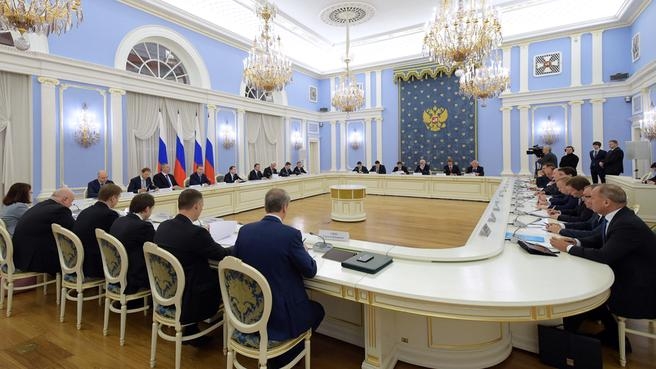Dmitry Medvedev’s opening remarks:
We met on Saturday to discuss the
situation in the agriculture industry and to ensure its sustainable
development. Today we’ll talk about the sustainable operation and performance
of the manufacturing sectors. We’ll
talk about the effect which last year’s developments have had on them, their operation and the steps we need to take to
maintain growth.
In 2014, many Russian companies maintained an upward trend despite a negative market situation and certain events. This year, we’ll need to assist those who plan to maintain or increase production, renovate their companies or create new production facilities, or enter new markets.
We will discuss measures to ensure import substitution – in fact, the action plan is clear – and update a number of earlier adopted decisions based on new developments. The anti-crisis measures designed to encourage demand for competitive products, to maintain the volume of output and to deal with the acute problems in industry have been prepared. Today we’ll discuss them.
We need to approve the final import substitution plan by July. As I’ve said, some measures are already being implemented. They concern the pharmaceutical industry, some mechanical engineering sectors, the agriculture industry and the defence industry. In some cases, we’ll need to take difficult and nonstandard decisions, bearing in mind that our plans will take into account all circumstances, including foreign restrictions.
Today we’ll also talk about novel national technology that could bolster industrial growth, save resources and reduce our negative influence on the environment as much as possible. I’d like to remind you that last year we approved a programme for the implementation of the next accessible technology and prepared reference papers for some industries. When implementing this programme, we should both rely on available foreign technology and also make use of domestic achievements and stimulate their implementation by Russian companies.
Despite the current restrictions, we have the ability to further develop our production capacities and to support the export of high-tech products. We’ll use project financing, the Industry Development Foundation, as well as the system of government purchases and other instruments to support our manufacturing sectors and export-oriented companies.
We must also work to diversify the markets for our
products. We have been developing an export infrastructure in the Russian Far
East, although European markets are very important to us. However, we need to
expand our trade and economic cooperation with Asian, African and Latin
American countries. As you know, the APEC countries account for over 25 percent
of Russia’s trade. But we need to once again consider its advantages,
opportunities and limitations.
Let’s talk about all of this.







